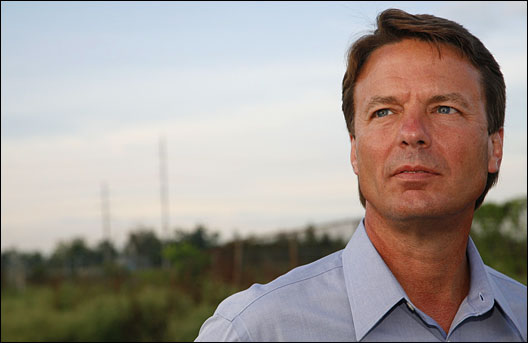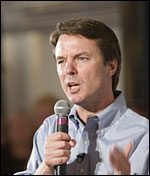
This is part of a series of interviews with presidential candidates produced jointly by Grist and Outside.
Update: John Edwards dropped out of the presidential race on Jan. 30, 2008.

John Edwards has gone to great lengths to outshine the top Democratic candidates with an aggressive environmental platform. On the 2008 campaign trail, this blue-collar defender has painted himself as a bleeding-heart greenie.
The first candidate to call for an 80 percent reduction in greenhouse-gas emissions by 2050 and the first to make his campaign carbon neutral, Edwards has had a pied-piper effect on the other Dem contenders, prompting them to make similar pledges. He has also set himself apart with his call for a freeze on all development of coal power plants until they can be outfitted with carbon-sequestration technology. But the former senator from North Carolina runs with the pack in his enthusiasm for corn ethanol, and his green mantle is a fairly new accessory.
How committed is Edwards to his new green vision? To find out, I caught up with the candidate on his cell phone as he hurtled through the fields of rural Iowa in his campaign bus.
For more info on his platform and record, check out Grist’s Edwards fact sheet.
Listen to a clip of this interview:
You were the first presidential candidate to call for reducing U.S. greenhouse-gas emissions 80 percent by 2050, and you were the first to make your campaign carbon neutral. What inspired these pledges?
What inspired me is that the world is at crisis on this issue of climate change. It requires action now. I feel a personal responsibility and also a responsibility as a candidate for president to lead on these huge issues that face the country and the world, and there is none bigger than this one. Without American leadership, nothing will happen.
What makes you the strongest candidate on energy and the environment?
I’m not waiting to see what other candidates say, or what the political climate is. I believe that you have to lead if you want to be president of the United States. That’s the reason I came out early with a very bold plan to address climate change. So I think if you want to know who is the most likely candidate to lead in a serious way on this issue, look at who is leading throughout the campaign.
Can you give some examples of what makes your platform stronger than other candidates’?
First of all, the 80 percent reduction by 2050 is aggressive. I think it is completely achievable, but it is clearly aggressive. So is the banning of the building of any additional coal-fired power plants, until and if the carbon-sequestration technology is available. And the plan to make America producer of the most fuel-efficient vehicles on the planet.
The most central point I’d make is that all of us have to take responsibility in order to address an issue like climate change. The great movements in American history — and it is certainly true of the green movement — didn’t begin in the Oval Office, they began out here in America where people with convictions spoke out and stood their ground.
Your proposed ban on coal-fired power plants would cause a political firestorm. How will you push this through?
It’s like anything else: You have to make the case to the American people that it is the right and responsible thing to do. There will always be powerful interests that have a financial stake in the status quo; you just have to be a powerful advocate for America. It is our responsibility as stewards of the planet, and if America doesn’t lead on this, it is going to have devastating consequences to us and to our children.
Do you think we need a carbon tax?
Well, I think I accomplished the same thing in a different way. What I have proposed is capping carbon emissions in America, ratcheting the cap down each year to eventually achieve the goal of 80 percent reductions by 2050, and then auctioning off the right to emit greenhouse gases and using that money to change the way we use and produce energy in this country. I think it is just another mechanism for doing the same thing.
You’ve proposed a 40-mile-per-gallon fuel-economy standard by 2016. The auto industry argues this would cripple them. Can they hack it?
With the system I’ve proposed, they can. When we auction off the right to emit greenhouse gases, we will put a significant part of the proceeds toward helping automakers transition to the development of the most innovative and fuel-efficient cars on the planet.
What role should the U.S. play in crafting a new international climate agreement?
America’s responsibility is to clean up our own house in a very aggressive way, and as we are doing that then we have the credibility to go to China and India and the countries that are most crucial to developing a world response to this problem.
We — the great innovators that we are — need to make technology available to developing countries that will need it in order to achieve a significant reduction in greenhouse gases. China is building more than one coal-fired power plant a week and none of them are scrubbed, which will do incredible damage to the environment. America has to lead them in a different direction.
As president, would you support technologies that would worsen global warming even if they helped to reduce our dependence on foreign oil?
Technologies like liquefied coal? I am against liquefied coal. We cannot add to the damage that is already being done to the environment by using additional carbon-based fuels. I would come down on the side of making sure that America is doing what needs to be done about climate change.
Is Iraq a war for oil?
It’s a good question, but the answer would require getting inside of the head of George Bush.
The thing that I am certain is true is that our dependence on oil has an incredibly negative effect in trying to stop the forces of terrorism. It props up bad governments, particularly in the Middle East, who don’t educate their kids, don’t reform their governments, don’t economically develop, and in many cases are largely isolated from the rest of the world, and the main reason is because they are on drugs, and that drug is oil. So long as they are mainlining oil, they will never reform.
Which is why America needs to make a switch from our addiction to oil and carbon-based fuels to wind, solar, safer biofuels, and cleaner renewable energy, which will have positive impacts far beyond economic impacts. No. 1: It will create at least 1 million “green-collar jobs” in this country. No. 2: When we drive down the price of oil, it creates an environment where these countries that are mainlining oil all of the sudden have no choice, and they have to reform, they have to educate their kids, they have to economically develop.
On top of that, if you look at the consequences of America moving to develop biofuels, which are clearly crucial going forward, we have the landmass to support that here in America. But the Europeans probably do not, so they are either going to need to buy from us or develop their own capacity. And there is a very good chance that they will do that in Africa, in which case you help billions of people in Africa who have no means of helping themselves out of poverty. Which means the positive consequences of America leading on climate change are almost endless.
There’s concern in the environmental community over the impacts of corn ethanol. How will you structure policies to shift us away from corn ethanol and toward cellulosic ethanol?
The development of corn-based ethanol production and use now lays the foundation for the use of cellulosic ethanol in the future. By expanding the ethanol market, we build demand and infrastructure — such as biorefineries and distribution systems — that will be used for cellulosic production.
I’ll create new markets for ethanol by requiring all new cars to run on both gasoline and E85 ethanol, requiring 25 percent of chain gas stations to carry E85. I’ll also create a $13 billion-a-year New Energy Economy Fund to invest in renewable and energy-efficient technology, including new methods of producing and using ethanol, like cellulosic ethanol. To raise these resources, I’ll charge greenhouse-gas polluters for emission permits and repeal subsidies for big oil companies.
After climate and energy, what do you think is the most important environmental issue facing the nation?
As president, I’ll work to reverse every harmful environmental executive order and regulation issued by the Bush administration. In my first year, two of my top priorities will be submitting legislation that strengthens the Clean Air and Clean Water Acts and restoring the “polluter pays” principle in the Superfund.
What environmental achievement are you most proud of?
I am proud that I was the first presidential candidate to call for an 80 percent reduction of greenhouse-gas emissions by 2050. And I’m glad that other candidates have followed me in adopting this call for change.
Who is your environmental hero?
You know, that’s a funny thing: Today, I actually think it is Al Gore.
How has your experience with the natural world shaped your view of environmental issues and your approach to environmental policy?
One wonderful thing about running for president of the United States is that you get to see all parts of America. I have seen all parts of it from oceans to forests to rivers to streams to farms. We live on this beautiful planet and I feel a huge personal responsibility to protect it.
If you could spend a week in a park or natural area of the United States, where would that be?
Probably the Appalachian Trail.
Describe your most memorable experience or adventure in the outdoors.
Though they worked hard, my parents found time to take us camping at Hartwell Lake in Georgia with our extended family. We’d all pitch a tent and go fishing on the lake. We loved it.
I’ve since been blessed to have the opportunity to share the outdoors with my own kids. In the summer of 1995, my son Wade and I climbed Mount Kilimanjaro. The climb was physically challenging, but eventually I joined Wade and our friends at the top. I’ll never forget the experience.
I think passing a love of the outdoors through generations is a great American tradition — a powerful reminder of our obligation to act as stewards. When we go hiking or swimming or camping or boating with our kids, we’re reminded of both the gift and the responsibility we’ve been given.
You have been criticized for building a large house. How do you reconcile that with concerns about consumption and energy use?
From the very beginning we were very energy conscious with this home, which is how we got a five-star rating, and it’s why we use solar to provide some energy. It is why [my wife] Elizabeth and I are committed to our home being carbon neutral, and our campaign being carbon neutral.
What kind of car do you drive?
We drive a Ford Escape Hybrid.
If George Bush were a plant or an animal, what kind would he be?
George Bush is like the dry brush in Crawford, Texas, and it’s time to clear the brush.



